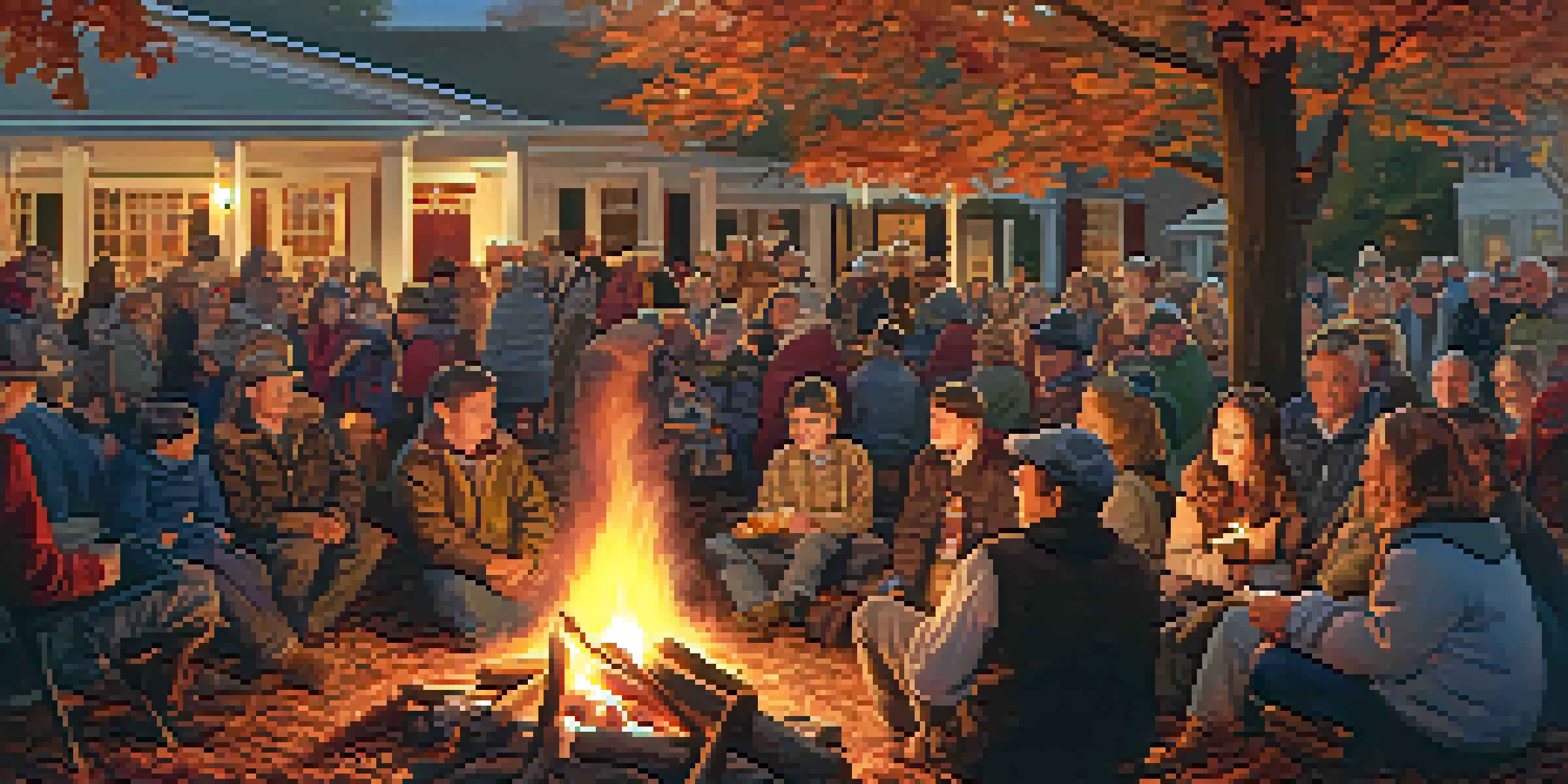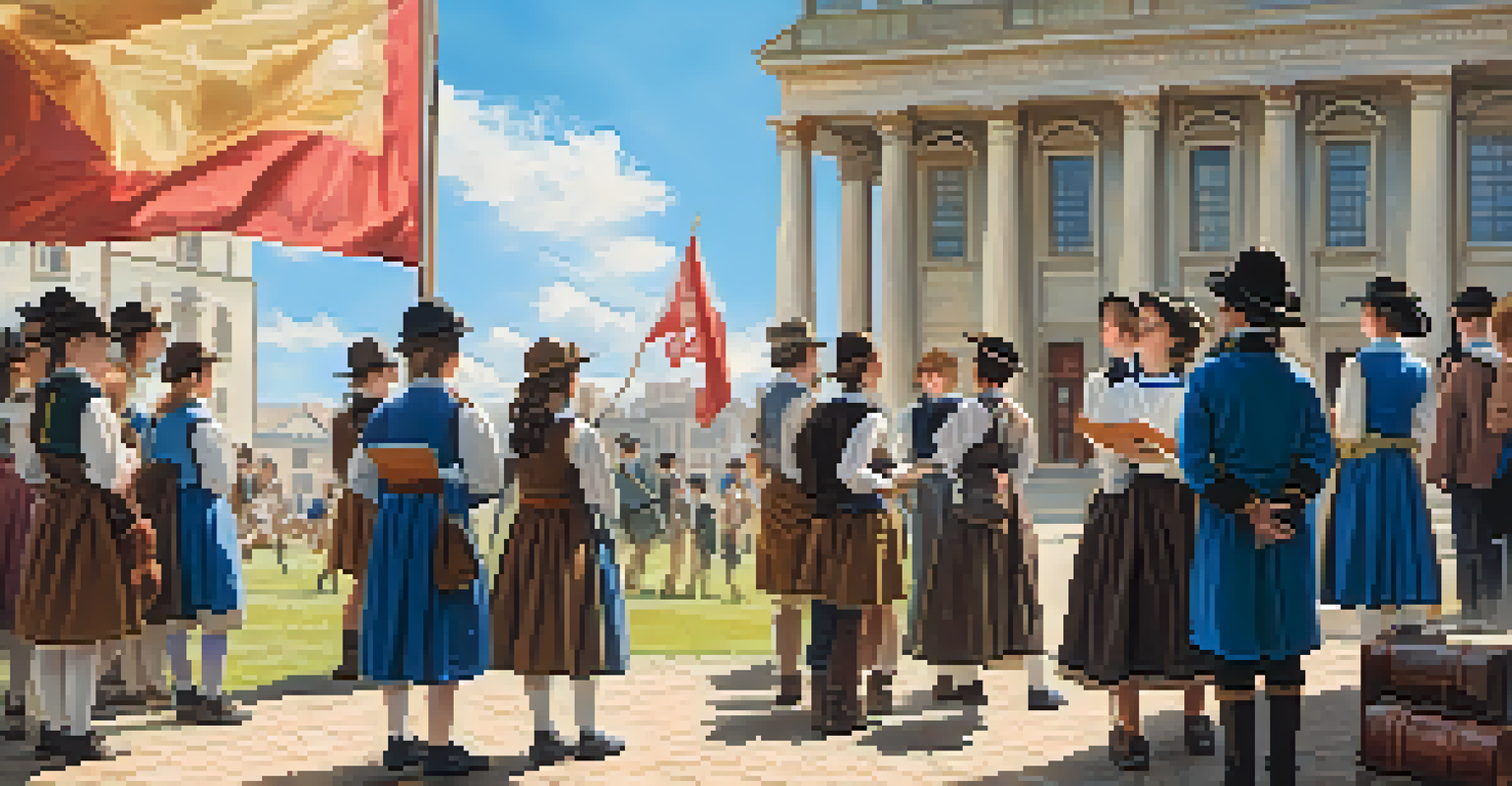The Importance of Local Historical Societies in Education

Local Historical Societies: Guardians of Community Heritage
Local historical societies serve as custodians of a community's past, preserving artifacts, documents, and stories that reflect its unique heritage. These organizations play a pivotal role in safeguarding the historical narrative that shapes local identity. By maintaining archives and hosting exhibitions, they invite residents and visitors alike to explore the rich tapestry of their community's history.
History is not a burden on the memory but an illumination of the soul.
Moreover, these societies often collaborate with schools to enrich educational programs, offering resources that help students connect classroom learning with real-world history. This connection fosters a sense of pride and belonging among students as they learn about their community's contributions to broader historical events. In many ways, the society acts as a bridge between the past and present, making history relevant and engaging.
As a result, local historical societies not only preserve history but also inspire a new generation of historians, researchers, and engaged citizens. They demonstrate that history is not just about dates and facts, but about people and their stories, making it a living, breathing part of the community.
Enriching Curriculum Through Local History
Integrating local history into educational curricula provides students with a deeper understanding of the world around them. Local historical societies offer a wealth of resources, such as primary source documents and oral histories, that can enhance lessons in various subjects, from social studies to language arts. This type of experiential learning can ignite curiosity and foster critical thinking skills among students.

For instance, a school project exploring the history of a local landmark can lead students to uncover surprising facts about their town's past, sparking discussions about broader historical themes such as migration, industry, or social change. By grounding students' learning in their own community, these societies help make history more relatable and engaging.
Preserving Local Heritage
Local historical societies safeguard community history by preserving artifacts and stories, enriching local identity.
Furthermore, these partnerships often extend to field trips, where students can visit historical sites, museums, or society events. Such hands-on experiences not only solidify students' knowledge but also create memorable moments that deepen their appreciation for history.
Fostering Community Engagement and Participation
Local historical societies are not just about preserving the past; they actively engage community members in various activities. By hosting workshops, lectures, and reenactments, these societies create opportunities for residents to participate in their local history. This fosters a sense of community and encourages individuals to take pride in their heritage.
The past is never dead. It's not even past.
Volunteer opportunities are abundant in these organizations, allowing residents to contribute their skills, whether it be cataloging artifacts, leading tours, or organizing events. Such involvement strengthens community bonds and provides individuals with a sense of ownership over their local history. When people invest their time and energy in preserving their past, they often feel more connected to their community.
Moreover, local historical societies can serve as platforms for dialogue and discussion, addressing contemporary issues through the lens of history. By examining past events, community members can better understand present challenges, creating a more informed and engaged populace.
Building Intergenerational Connections
One of the unique aspects of local historical societies is their ability to bridge generational gaps. These organizations often attract members from various age groups, creating a rich tapestry of knowledge and experience. Older generations can share firsthand accounts of historical events, while younger members can bring fresh perspectives and technology skills to the table.
This intergenerational exchange not only enriches the society's activities but also fosters respect and understanding between different age groups. For instance, a young volunteer might learn about the local history of a significant event from an elder who lived through it. Such connections can create lasting friendships and mentorship relationships that benefit both parties.
Engaging Community Participation
These societies foster community pride and involvement through workshops, events, and volunteer opportunities.
Furthermore, the sharing of stories and experiences helps to keep the community's history alive and relevant. It reinforces the idea that history is not just a collection of facts but a living narrative that continues to evolve with each generation.
Promoting Lifelong Learning Opportunities
Local historical societies are excellent resources for promoting lifelong learning. They often offer workshops, lectures, and seminars that cater to all ages, encouraging individuals to explore new subjects and dive deeper into their interests. This commitment to education ensures that learning extends beyond the classroom and into the community.
For example, a society might host a genealogy workshop, helping participants trace their family history and learn valuable research skills. Such programs not only provide practical knowledge but also foster a sense of connection to one’s roots, making history feel personal and relevant. This kind of engagement can ignite a passion for learning that lasts a lifetime.
By providing access to various resources and expertise, local historical societies empower individuals to take charge of their education. In doing so, they contribute to a culture of curiosity and inquiry that benefits the entire community.
Creating a Sense of Place and Identity
Local historical societies play a vital role in cultivating a sense of place and identity among community members. By highlighting the unique stories, traditions, and contributions of the area, these organizations instill pride and belonging among residents. This sense of identity is crucial, especially in an era where globalization often dilutes local cultures.
Through events like community fairs, heritage days, and storytelling nights, societies encourage residents to celebrate their local history. Such gatherings not only bring people together but also reaffirm the value of local traditions and narratives. When communities embrace their heritage, they strengthen their identity and resilience against external influences.
Promoting Lifelong Learning
Local historical societies encourage lifelong learning by offering workshops and resources that connect individuals to their heritage.
Ultimately, a strong sense of place fosters community cohesion and encourages individuals to be active participants in preserving their local history. This collective identity can inspire efforts to protect and promote the community's unique characteristics and stories for future generations.
Advocating for Preservation and Awareness
Local historical societies advocate for the preservation of historical sites and artifacts, ensuring that future generations can appreciate their community's heritage. These organizations often work alongside local governments and preservation groups to protect significant landmarks, making them accessible for educational purposes. Their efforts help raise awareness about the importance of preserving history in the face of modernization.
Moreover, societies often engage in educational campaigns to inform residents about local history and its significance. By hosting events and creating materials that highlight their community's past, they foster a deeper appreciation for historical preservation. This advocacy is essential as it helps ensure that local stories and sites are not forgotten amidst rapid change.

In doing so, local historical societies not only preserve the past but also inspire a sense of responsibility among community members to protect their heritage. This collective effort can lead to a more informed and engaged populace, ready to celebrate and safeguard their local history.